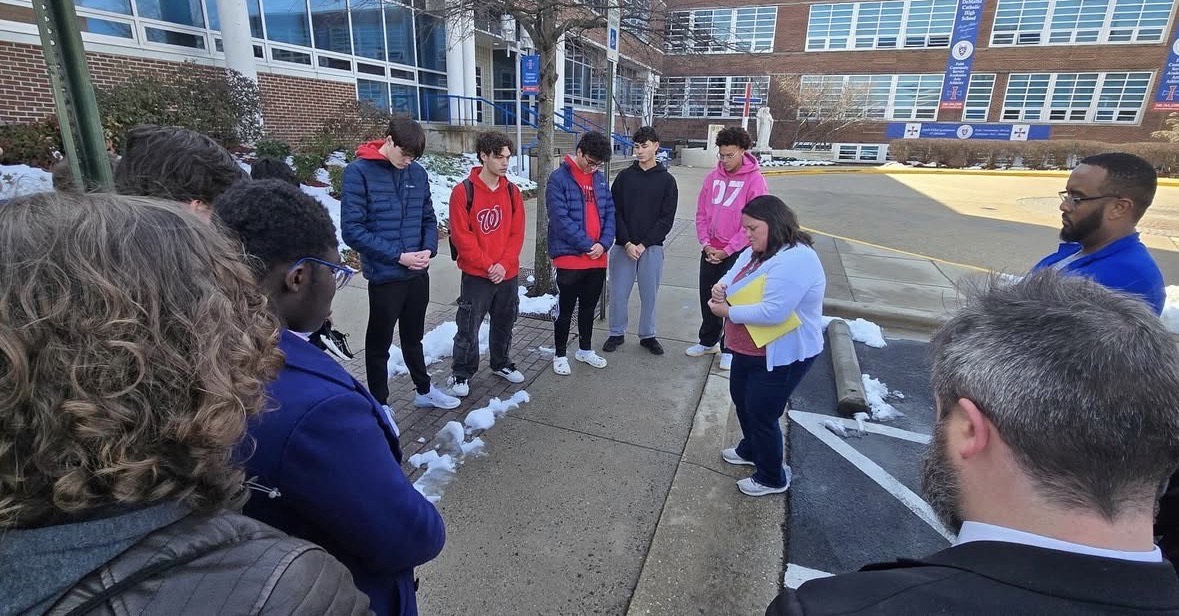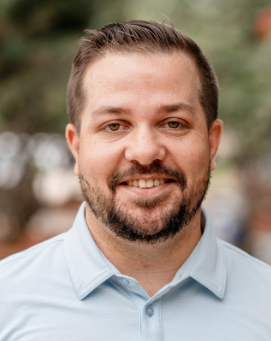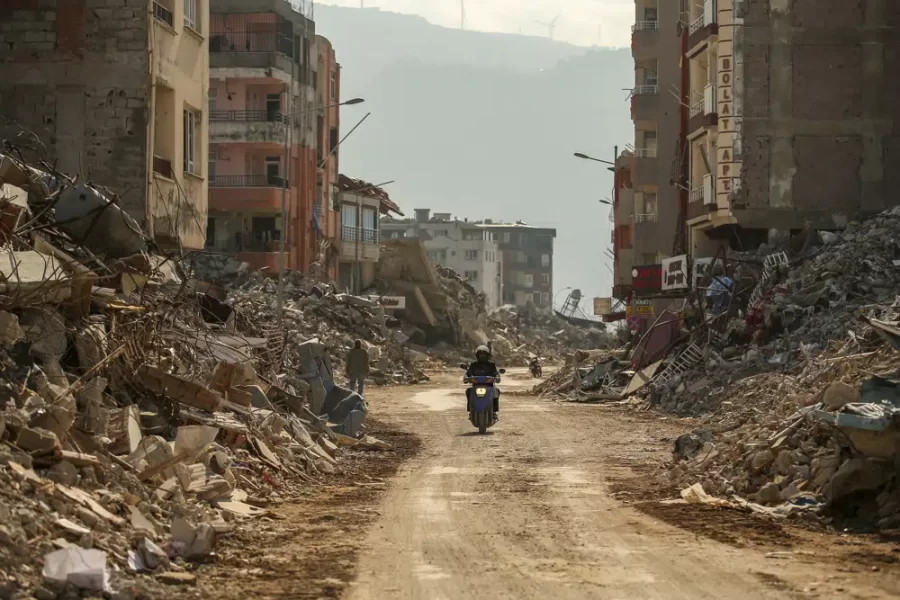“It Was Like the Apocalypse”: The Earthquake in Türkiye and Syria and it’s Consequences
A man in Samandag, a city in southern Türkiye, rides his motorcycle down a devastated road. Credit: AP Photo/Emrah Gurel
March 1, 2023
On the night of February 6, a massive earthquake struck the border region of both Türkiye and Syria, causing extensive damages across the two countries. According to the AP, at least 50,000 people have died as of February 25 in the wake of the magnitude 7.8 quake, the strongest in the region in almost a century. Türkiye’s hardest hit region was the Kahramanaras province, with Syria’s being the area around Lattakia, a port city on the Mediterranean coast.
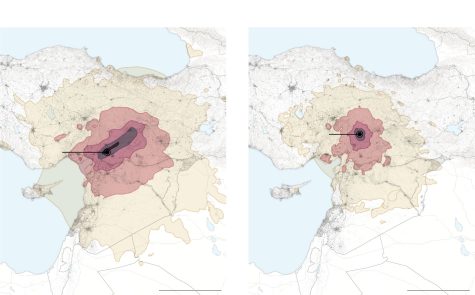
Credit: U.S. Geological Survey/ New York Times
Paired with harsh weather conditions, some have been comparing it to the end times. According to Abdul Salam al-Mahmoud, a Syrian impacted by the event, “it was like the apocalypse…people need saving.”
The high death toll is attributed to the timing of the earthquake. Striking during the early hours of the morning while many were sleeping, the resulting shocks collapsed many buildings and trapped inhabitants under rubble. While there have been many stories of people being rescued, including of a woman escaping after being trapped for 222 hours, as the weeks pass there is a less likely chance of finding survivors.
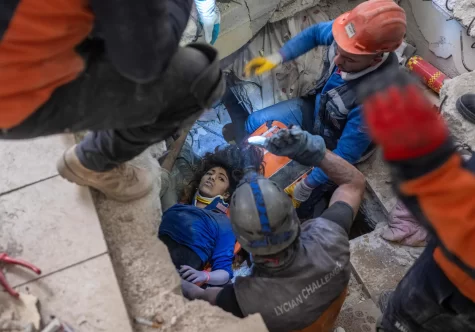
Credit: AFP/Getty Images/Bulent Kilic
Murat Kurum, the minister of the environment and urbanization of Türkiye, announced a variety of efforts by the Turkish government to build back. Chief among them are the destruction of more than 50,000 buildings that are structurally unsafe, the building of temporary housing in the forms of tents and containers to house displaced people, and the repairing of vital infrastructure.
Despite the work of hundreds of thousands of volunteers and rescue workers, a variety of conditions have stalled aid. In Türkiye, where a bulk of the damage was caused, shoddy roads and poor internet has been a thorn in the side of relief efforts. Conversely, in Syria, it is hard to tell how much damage was caused, as 12 years of constant fighting has reduced government control of the areas hardest hit. The government, under the controversial President Bashar Assad, has been cooperating with both the United Nations and rebel forces to get aid to northwestern Syria.
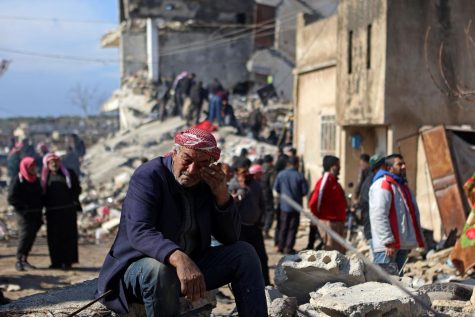
Credit: AFP
Tedros Ghebreyesus, the secretary general of the World Health Organization, said that they are shifting their focus to meet the health needs of survivors rather than look for more. “The search and rescue phase is now coming to an end, but for WHO, the task of saving lives is only just beginning.” Ghebreyesus, along with the WHO, seeks to double the $43 million appeal in aid after a trip to Syria, realizing the scale of the situation. Even though they have been able to help over half a million people in both countries already, there are still millions of people that have been displaced and are in desperate need of assistance.
Due to the extremely devastating nature of the event, many countries have come out with aid for both Türkiye and Syria. The United Arab Emirates have sent over $100 million in aid to both countries, and others have used this opportunity to thaw relations. Syria has been politically isolated in the Arab world for years, due to both the civil war and the harsh government rule. However, countries like Jordan have come out and publicly and physically supported relief efforts, and diplomats of the historically opposed countries of Armenia and Türkiye have met to coordinate aid.
While most of the world has come together to help the countries build back, the response towards certain measures has been shaky at best. Turkish President Recep Tayyip Erdogan, who like Assad has had his fair share of controversies, has come under more flak for his government’s slow movement during the crisis. Despite preparations for another massive earthquake since 1999, when the last major one hit, opposition politicians claim that the precautions were neutered by Erdogan’s leadership and policies.
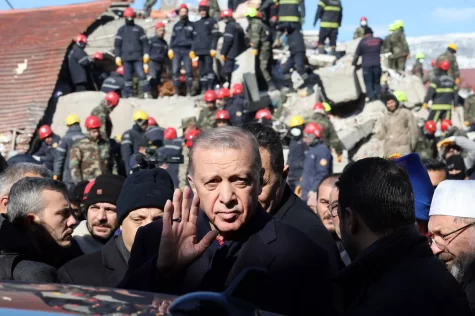
For example, he banned Twitter for 12 hours after people began to criticize the government’s response, which had the adverse effect of preventing contact between survivors and those trapped using the site to communicate. Additionally, while Türkiye has a high-standard code for building practices implemented after the 1999 earthquake, the “application is where we have big problems,” said Dr. H. Kit Miyamoto, a structural engineer.
Many also blame Erdogan’s extreme consolidation of power as a reason for the disastrous response. With the military being credited for their quick response in the previous earthquake, and saving many lives in the process, the inability of the government to enact such measures due to incompetent and slow processes has led to many deaths. Gönül Tol, Türkiye’s program director at the Middle East Institute, angrily spoke out against the President, as his father-in-law died after waiting a full day to get a concrete slab removed from his legs. “He hollowed out important institutions, he weakened them, he appointed loyalists who do not have the credentials in key positions and he wiped out civil society organizations.” With Erdogan facing a tough election this year, he will likely have to do a miracle to win back many people.
“It’s one-man rule, and he wants us to not talk about it. He wants us to die without complaining.”-Gönül Tol

